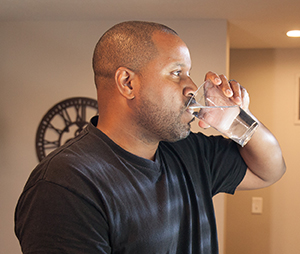Self-Care for Sore Throats
Self-Care for Sore Throats
Sore throats happen for many reasons, such as colds, allergies, cigarette smoke, air pollution, and infections caused by viruses or bacteria. In any case, your throat becomes red and sore. Your goal for self-care is to reduce your discomfort while giving your throat a chance to heal.
Moisten and soothe your throat
Tips include the following:
-
Try a sip of water first thing after waking up.
-
Keep your throat moist by drinking 6 or more glasses of clear liquids every day.
-
Run a cool-air humidifier in your room overnight.
-
Stay away from cigarette smoke.
- Check the air quality index,if air pollution gives you a sore throat. On high pollution days, try to limit outdoor time.
-
Suck on throat lozenges, cough drops, hard candy, ice chips, or frozen fruit-juice bars. Use the sugar-free versions if your diet or medical condition requires them.
Gargle to ease irritation
Gargling every hour or 2 can ease irritation. Try gargling with 1 of these solutions:
-
1/4 teaspoon of salt in 1/2 cup of warm water
-
An over-the-counter anesthetic gargle
Use medicine for more relief
Over-the-counter medicine can reduce sore throat symptoms. Ask your pharmacist if you have questions about which medicine to use. To prevent possible medicine interactions, let the pharmacist know what medicines you take. To decrease symptoms:
-
Ease pain with anesthetic sprays. Aspirin or an aspirin substitute also helps. Remember, never give aspirin to anyone 18 or younger. Don't take aspirin if you are already taking blood thinners.
-
For sore throats caused by allergies, try antihistamines to block the allergic reaction.
Unless a sore throat is caused by a bacterial infection, antibiotics won’t help you.
Prevent future sore throats
Prevention tips include:
-
Stop smoking or reduce contact with secondhand smoke. Smoke irritates the tender throat lining.
-
Limit contact with pets and with allergy-causing substances, such as pollen and mold.
-
Wash your hands often when you’re around someone with a sore throat or cold. This will keep viruses or bacteria from spreading.
- Limit outdoor time when air pollution is bad.
-
Don’t strain your vocal cords.
When to call your healthcare provider
Contact your healthcare provider if you have:
-
Fever of 100.4°F (38.0°C) or higher, or as directed by your healthcare provider
-
White spots on the throat
-
Great Trouble swallowing
-
A skin rash
-
Recent exposure to someone else with strep bacteria
-
Severe hoarseness and swollen glands in the neck or jaw
Call 911
Call 911 if any of the following occur:
- Trouble breathing or catching your breath
- Drooling and problems swallowing
- Wheezing
- Unable to talk
- Feeling dizzy or faint
- Feeling of doom
Updated:
January 31, 2020
Sources:
Symptomatic treatment of acute pharyngitis in adults. UpToDate
Reviewed By:
Ashutosh Kacker MD,Marianne Fraser MSN RN,Daphne Pierce-Smith RN MSN CCRC
